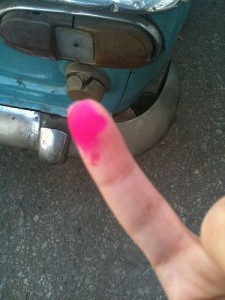Voices of Egypt
Posted on: September 3, 2012, by : Editor Karama has launched a new initiative to share interviews with women who took part in Egypt’s revolution. Our first in this series is with Samar Saad Abdelrahman, who is a 23 year old intern at Care International in Egypt. Karama caught up with her in the wake of Egypt’s March 19 constitutional referendum.
Karama has launched a new initiative to share interviews with women who took part in Egypt’s revolution. Our first in this series is with Samar Saad Abdelrahman, who is a 23 year old intern at Care International in Egypt. Karama caught up with her in the wake of Egypt’s March 19 constitutional referendum.
Can you explain your experiences during the first two weeks of the revolution?
It was an experience of joy and sadness at the same time. I was full of hope that Egyptians could change their future, but I found myself sometimes laughing and crying at the same time. It was like a dream coming true. Those days were what generations waited so long for, and I was part of it.
Where were you? How did you feel? How did you decide whether to participate or not?
Since day one, I was there. On January 25th, we started as small groups in different spots around Cairo and walked toward Tahrir, full of determination to resist the security forces and reach the square. We spent the day in Tahrir waiting to be attacked by State Security, and this was exactly what happened. They used a massive amount of tear gas and rubber bullets. I got shot by seven rubber bullets that day, but this made me determined to come back the next day and next day. For the first time I felt that I could make real change and empowered by my determination, that my dream could defeat their fragile weapons.Despite the fact that I am only 23 years old, participation in the revolution was a call to answer, not a decision to take. Like many others, I was just waiting for the right moment to get rid of this rotten regime.
How do you see your role in what is happening after the revolution?
As I work in development, I see myself more in taking developmental initiatives and focusing on raising political awareness. Our strategy and methods in development should change and take a new turn to be updated with the spirit of our revolution and to be more effective. I am not planning to join any movements or parties, but I plan to follow what I think will lead to democracy.
How did you see women’s participation in the first events, and now?
Women’s participation was a main source of happiness that I felt during the revolution. We were Egyptians, not female and male. Women were there fighting the security forces like men. We were there sleeping in the square, sharing the moments of joy and depression together. There was no Harassment, and people respected women and dealt with them equally. This is a revolution of the new generation that is open minded and respects each other regardless of gender. I am not saying that we are cured of gender issues, but I am saying that this generation that participated in the revolution can also fight tradition and gender inequality. People now understand that power is in every person’s hands and society is not divided by hierarchy.
What are your expectations and fears for the next period?
I hope that disadvantaged groups will participate more in decision making, but I worry about changes in values and beliefs in society. I am optimistic about increases in freedom of expression and a larger role for the media, but worry about a period of political chaos where new political groups appear, are racing towards ruling Egypt, and will use religion to convince people of their principles. I’m hopeful that the economic crisis can be overcome with an organized set of policies and international cooperation.
How do you evaluate our revolution so far? What are the positive and negative aspects?
I found our revolution a spontaneous act that came in a very organized and peaceful way. However, I am not satisfied with the results; I call our revolution an incomplete uprising. I do not trust or like that the army is in control and I believe that using religion in this specific era could lead to ethnic war or take us to a dictatorial Islamic regime. I am worried about the political ignorance that Egyptians built up over the last 30 years of dictatorship, and that this could cause future problems that cannot be fixed by a revolution.
Has there been any change in your political participation? How and why?
I am keener now to listen to every single piece of information or news update I can, so I can have a full image of what is happening. I still do not believe in the current parties and think they are not powerful enough. However, I can see myself joining one of the youth movements since they are open more to diversity and accountability.
Has there been any change in your personal life or daily activities?
I used to watch the news and read before the revolution, but now I am more into the rapid fire news coming from the online social networks. I also attend more political sessions and discussions.
Thank you very much, Samar, for sharing your experiences with us.
Image courtesy of Kodak Agfa under a Creative Commons License.
